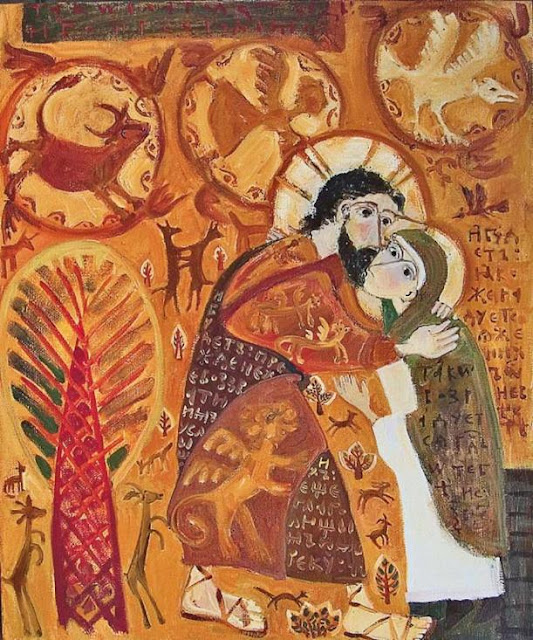Giordano Luca, Pilatos lavándose las manos (1655 – 1660),
óleo sobre
lámina de cobre (43 x 66 cm), Museo del Prado (Madrid)
...
Terminados ya los cinco domingos en que escuchamos el capítulo sexto del evangelio según san Juan,
hoy volvemos a recuperar el evangelio correspondiente a este ciclo y que ya no
dejaremos hasta el final del año litúrgico[1]. Lavarse
las manos antes de comer era entonces uno de los gestos externos de pureza
moral. Y a los fariseos de todos los tiempos siempre nos han importado mucho
los gestos externos. Al Señor no tanto, justo por eso dice que lo limpio y lo
sucio del hombre no está en las manos, sino en el corazón. Y lo dijo por todos
nosotros, por los cristianos que nos lavamos las manos y vamos por ahí con
nuestras manos cristianamente lavadas, pero con el corazón cristianamente sucio.
Jesús no dijo: "Bienaventurados los que se lavan las manos, porque así
verán los hombres que estáis limpios", sino “Bienaventurados los limpios
de corazón, porque ellos verán a Dios"[2], y
¡Mira tú qué cosas! A él lo iba a condenar a muerte un hombre que tuvo buen cuidado de que el pueblo lo viera lavarse las manos[3], y
a llevar a la cruz unos que, antes, no quisieron entrar en el pretorio para no
contaminarse[4].
Jesús quiso trazar una línea bien clara entre los limpios de corazón y los que
se lavan las manos. Y es que lavarse las manos es fácil; lo difícil es lavarse
el corazón. Todos sabían que el gesto de Pilato no valía y hoy aún seguimos
creyendo ciegamente en los gestos externos. Lavarse las manos y luego
convencerse de que uno no puede hacer nada ante tantas situaciones injustas que
hay cerca y lejos de nosotros, no vale. Lavarse las manos y luego decir que es
una pena que haya pobres, enfermos, guerras, desastres, no vale. Lavarse las
manos y luego decir que uno no puede cambiar el mundo, no vale. Es mucho más
fácil lo que hizo Pilato para lavarse las manos, que lo que tuvo que hacer, por
ejemplo, Zaqueo, para lavarse el corazón. A Pilato le bastó un gesto
espectacular y estúpido. Pero a Zaqueo, para lavarse el corazón, le hizo falta
devolver cuatro veces lo robado y dar la mitad de lo suyo a los pobres[5]. No
sirve lavarnos las manos nada más. Sólo la bondad nos hará limpios por dentro,
junto con la negación de nuestro propio egoísmo y la generosidad, la entrega,
el trabajo por los demás. Y no es que falten entre nosotros los limpios de
corazón que nos contagien su bondad. Es más, la gente buena que hay a nuestro alrededor;
algo de polvo tendrán en las manos, pero tienen fundamentalmente limpio el
corazón. "Ustedes están limpios, aunque no todos"[6],
les dijo un día Jesús. Sólo uno no estaba limpio. Casualmente era uno que tenía
las treinta monedas aferradas, no precisamente con las manos, sino con el
corazón[7] •
AE
[1] Se trata del
Ciclo B, el correspondiente a san Marcos.
[2] Mt 5,8.
[3]
Id, 27, 24.
[4] Cfr. Jn 18, 33.
[5] Cfr. Lc 19, 1-10.
[6] Cfr. Jn 13, 10.
[7] Cfr. Mt 27, 3.














